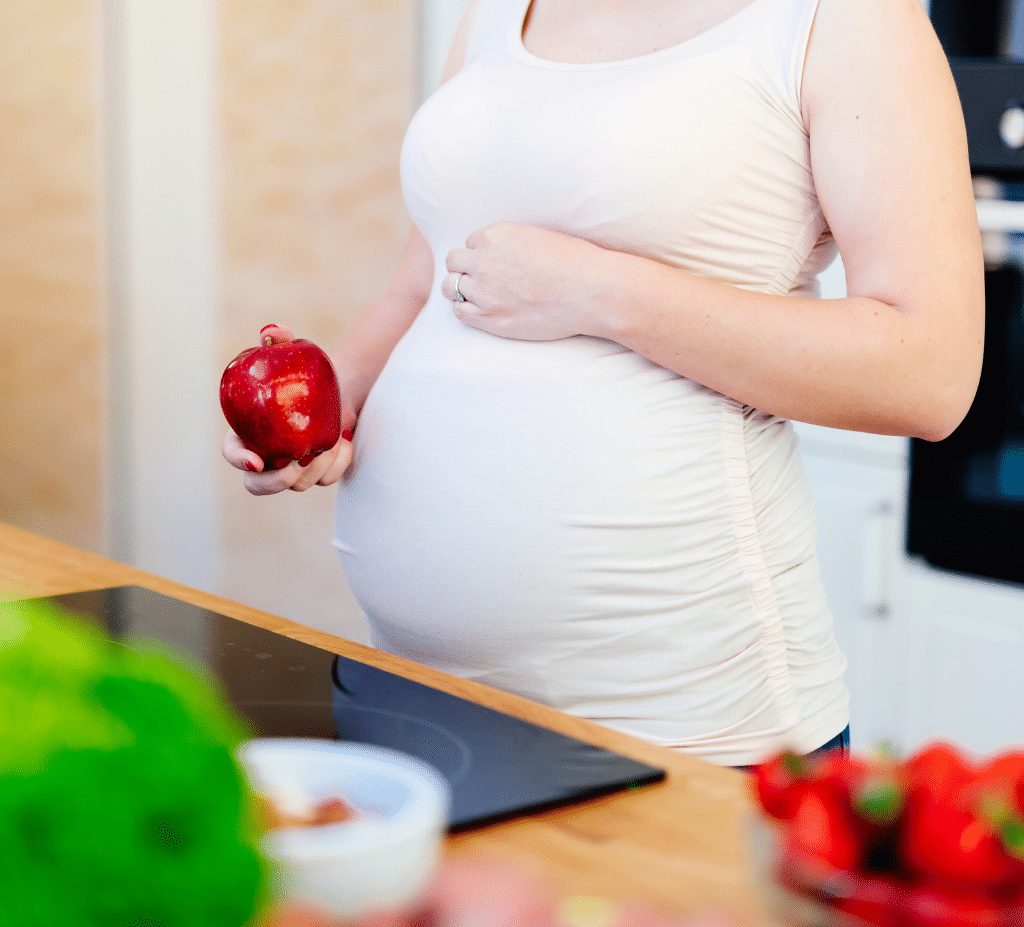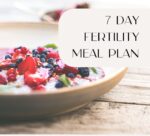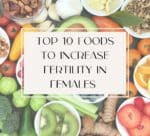Being pregnant is such an exciting time, full of joy and wonder. Everyone offers their Congratulations and Best Wishes for the new Mom and Dad to be. Soon thereafter however, comes the onslaught of unsolicited advice and demands. Sayings like “you have to eat for two now” OR “If you have a craving and don’t eat it, your baby will have a birthmark of that food on it’s body ” and “One glass of wine is ok, people in Europe do it all the time.” This advice is just that, advice, and it has no merit in actual nutrition recommendations during pregnancy. Here are a few more commonly asked questions and recommendations for when you are pregnant.
1. How much weight should women gain in pregnancy?
When it comes to weight gain targets, there are recommendations that can help give you guidance. Weight gain targets are based on your pre-pregnancy BMI (Body Mass Index). BMI provides a number that is your looks at your weight compared to your height. It used to be widely used as an indicator of health which is now agreeably, being put into question however, when it comes to weight gain measures, this is still the marker used.
Table 1.0 for details
Table 1.0 Weight Gain Recommendations for Singleton Pregnancies.
| Mean wt gain in 2nd + 3rd trimester | Recommended total wt gain | ||||
| Pre-Pregnancy BMI | kg | lb/wk | kg | lbs | |
| <18.5 | 0.5 | 1.0 | 12.5-18 | 28-40 | |
| 18.5-24.9 | 0.4 | 1.0 | 11.5-16 | 25-35 | |
| 25-29.9 | 0.3 | 0.6 | 7-11.5 | 15-25 | |
| >30 | 0.2 | 0.5 | 5-9 | 11-20 |
The first trimester starts at week 1 and ends at week 12. The second trimester runs from week 13 to week 26 and the third trimester starts in week 27 and goes to the end of the pregnancy. In the 1st trimester, weight gain is expected to be minimal, as the baby does not have high energy requirements. It is in the 2nd trimester where weight gain is expected to begin and steadily increase through the third trimester to the end of the pregnancy. See Table 2.0 Gestational Weight Gain chart for all pre-pregnancy BMI categories (https://www.canada.ca/en/health-canada/services/canada-food-guide/resources/prenatal-nutrition/eating-well-being-active-towards-healthy-weight-gain-pregnancy-2010.html).

2. Should women give in to their cravings? Could cravings mean the baby needs a particular nutrient?
This is a very good question. Cravings are an ongoing topic of conversation and truthfully, the exact mechanism or pathway that triggers cravings continues to elude the scientific community. We just don’t know why, specifically during pregnancy, women have increased cravings for different foods however, there are many theories available to try to explain it.
One theory does include the idea of nutrient deficiencies. Commonly, cravings happen more in the 2nd trimester. It can be understood that our bodies are telling us we need a certain nutrient over another, and this drives us to eat it. For example, craving ice cream is quite common, and this makes sense in that we know calcium requirements increase during pregnancy, so our body is telling us to meet that need by eating ice cream. However, ice cream does not carry the most calcium per gram of food so the question bears, why don’t we crave something like milk instead?
Another theory related to the hormonal changes during pregnancy. We all know that hormones change significantly during pregnancy, so maybe this is causing us to crave certain foods? These changes can alter our taste and smell perceptions, allowing us to be more sensitive to certain foods and possibly sensitive to unfavorable effects at certain times during our pregnancy. In this way, we crave foods that we can better tolerate.
Stress and drivers of stress is another theory used to explain cravings. The stress of a new family, the pressures of raising a new baby and a managing a new family can be overwhelming and so unconsciously, the stress manifests as cravings for comfort foods.
As you can see, there are many theories to try to explain the driving force behind our cravings and more research is needed in this area.
3. Should women eat during the night or whenever they are hungry?
This is a 2-part answer which includes both yes and no. Women should Yes, respond to their hunger cues and eat when they are hungry and stop eating when satisfied. When you are pregnant, your energy needs increase and therefore you do need to eat more calories to meet the growing needs of the baby and your body. In the 2rd trimester, energy needs increase to approximately 340kcal/day and in the 3rd trimester, they increase approximately 450kcal/day. This equals to a small snack in the second trimester and a large snack in the third.
Having said that, if you are hunger in the night often and it is interrupting your sleep schedule, I recommend having a conversation with a Registered Dietitian and your doctor to find ways that can determine why you are getting up in the night so often. How is your intake during the day? Are you meeting your needs? What is happening that is causing you to get up and eat in the night? It is common to have some sleep problems during pregnancy as hormonal changes can lead to sleep disturbances however, if it is happening very often, I would recommend to looking into it further by consulting with your doctor.
4. When women gain too much weight in pregnancy, are more fat cells (adipose cells) made or are the existing ones enlarged?
When a body gains adipose tissue as weight, the common understanding is that those cells will grow and expand until they reach a certain size. Once the size of the cell reaches its maximum capacity, they will begin to multiply. There is no limit on their ability to multiply and once the body has created more adipose cells, the body does not get rid of them. They can shrink in size, they can die and be replaced, but it is understood that they will not disappear to the number we had prior to them multiplying. Hence adipose weight gain occurs in 2 ways, 1) our fat cells grow and get larger to a maximum size and 2) If continued weight gain in the form of adipose tissue continues, the cells will multiply to make more room. A study here from 2016, compared adipose tissue during pregnancy in trimester 1 and trimester 3 in women with a BMI 18-24 and women with BMI >30. They saw that some women accumulated fat in existing adipocytes cells and others had signs of multiplying their current adipose cell numbers. In this study in 2015 however, they noted that women increase fat mass during pregnancy despite slight increases in energy expenditure and suggest that energy storage efficiency improved during pregnancy. So, it does appears that both occurs in our bodies depending on our weight gain and our cells capacities.
5. What are the potential consequences of gaining too much weight in pregnancy for the mother?
Gaining too much weight (beyond the recommended guidelines) during pregnancy is known to lead to adverse health consequences for Mom. Once effect is that once the baby is born, the more weight that has been gained beyond the recommendations, the harder it can be to lose it and get back to your pre-pregnancy weight. This can lead to health issues that affect your joints, your breathing, sleep, mood, energy levels and increase your risk of developing diabetes or heart disease. Other risks to Mom includes a condition called pre-eclampsia which happens during pregnancy. This a combination of high blood pressure and signs of damage to another organ system, most often the liver and kidneys. The only way to get rid of pre-eclampsia is to have the baby. As well, Mom’s risk is higher of developing Gestational diabetes, it is higher for risk of Caesarean section and higher of having a baby that is large for his/her gestational age. This can lead to delivery complications for both Mom and baby. As well, gestational diabetes also increases your risk of developing Type 2 Diabetes later in life. So, there are a lot of conditions that can be better prevented when a healthy weight gain occurs during pregnancy.
6. Does excessive caloric intake and/or sugar intake impact the health of the baby? Is there potential for any long-term consequences?
A mother’s diet, rich in nutrients, protein, carbohydrates, and healthy fats provide a growing fetus the environment to thrive during the development and growing process. Creating organs, bones and a working system takes a significant amount of both micro and macronutrients from Mom, so it is important to ensure a balanced diet is provided for both Mom and baby. A diet high in sugar can provide too much of one thing and not enough of others, which can cause deficiencies. For example, if too much sugar and not enough nutrients is what the baby has to grow on and develop, then that baby’s development is altered to compensate for its environment. If the baby is at the stage of creating the organs that will become the kidneys and it does not have what it needs, then the structure and/or function of the kidneys will be altered. With knowing that, it is starting to be understood that certain chronic diseases in adulthood may have their origins in the womb. As well, other conditions such as increased birth weight and excess neonatal adiposity, increase the risk of obesity, diabetes Type 2, cardiovascular risk factors and metabolic syndrome later in life. Of course, we do not have all the answers and lots of research is still required but it does lead to understanding the importance of adequate nutrition during pregnancy.
7. Do you have any tips or strategies for women to avoid gaining excessive weight? (Eating and overeating can be such multifaceted issues; nevertheless, there may be some general principles or tips that could be helpful.)
Yes definitely! Talk to a Dietitian! There are many resources and good information available to help manage your way through your pregnancy and you can talk to your doctor about seeing a dietitian or search for one via the College’s website, to help you navigate what you can do to have the best pregnancy and outcome for both Mom and baby!
These questions and answers are not an exhaustive list of all the concerns, recommendations and happenings that occur when one is pregnant. Overall, however pregnancy can be a time of happiness, excitement and wonder for everyone involved. Eating a healthy balanced diet, enjoying movement and relaxation exercises can create a thriving and optimal environment for you and your baby.
If you have any questions or concerns, please feel free to contact me at teresa@liveandlovenutrition.com.





Leave a Reply
You must be logged in to post a comment.